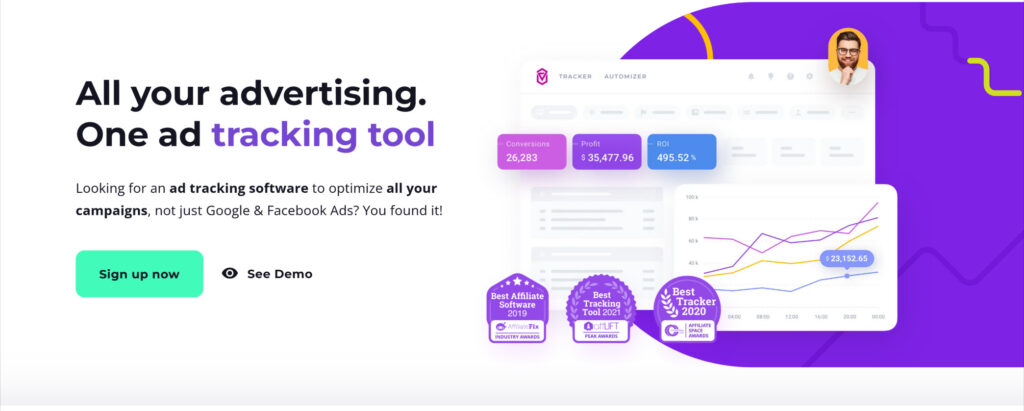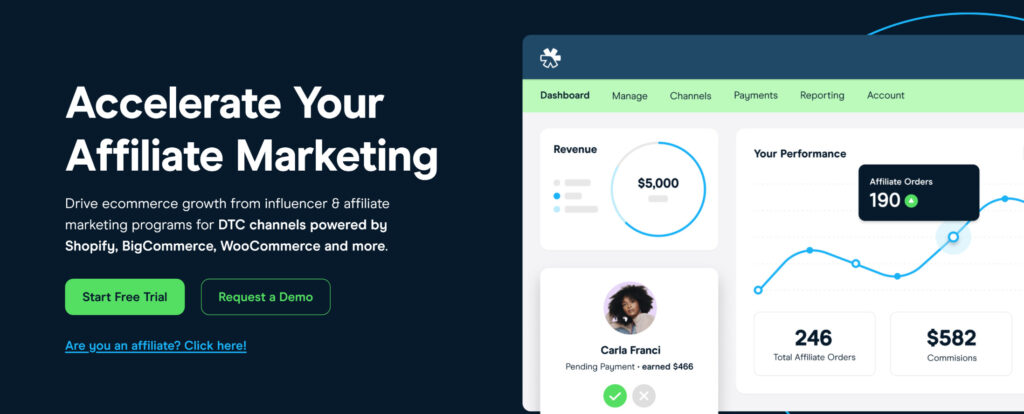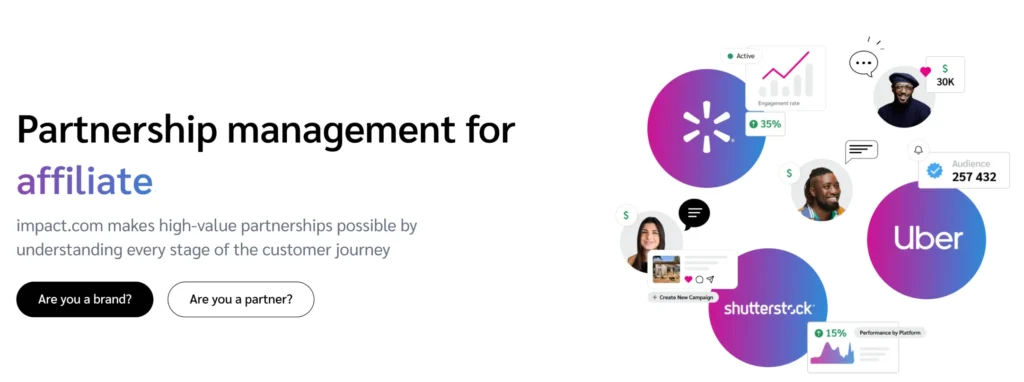Affiliate marketing has emerged as a popular way for individuals and businesses to generate passive income by promoting products and earning commissions. This article will provide you with valuable insights, tips, and strategies to navigate the world of affiliate marketing successfully.
Understanding Affiliate Marketing
Affiliate marketing is a performance-based marketing model where affiliates promote products or services of other companies and earn a commission for every sale or lead generated through their efforts. It involves three main parties: the merchant, the affiliate (or publisher), and the customer.
Benefits of Affiliate Marketing

Affiliate marketing offers numerous benefits for both affiliates and merchants. Affiliates can monetize their online platforms, build passive income streams, and leverage existing audiences. Merchants benefit from increased brand exposure, expanded customer reach, and a cost-effective marketing channel.
- Cost-Effective Marketing: One of the primary benefits of affiliate marketing is its cost-effectiveness. Merchants only pay commissions for actual sales or leads generated through affiliate efforts. This model minimizes upfront marketing costs for merchants, making it an attractive option, especially for small businesses with limited budgets.
- Performance-Based Compensation: Affiliates are compensated based on their performance, incentivizing them to drive quality traffic, leads, or sales. This results-driven compensation model ensures that merchants pay for tangible results, aligning interests between merchants and affiliates.
- Expansive Reach and Exposure: Affiliates, often possessing niche expertise or a loyal following, can extend a brand’s reach to new audiences. Merchants benefit from increased exposure, tapping into diverse markets they might not have reached through traditional marketing channels.
- Diverse Affiliate Networks: Affiliate networks serve as platforms connecting merchants with a vast pool of potential affiliates. This facilitates streamlined collaboration, allowing merchants to choose affiliates aligned with their brand, products, or services.
- Reduced Risk for Merchants: Since payment is contingent on actual results, merchants bear minimal financial risk in affiliate marketing. This risk mitigation aspect makes affiliate marketing an attractive avenue for businesses looking to explore new marketing channels.
- Affiliate Expertise and Authenticity: Affiliates often have a deep understanding of their audience and can authentically endorse products or services. This lends credibility to marketing efforts, as consumers are more likely to trust recommendations from influencers or content creators they follow.
- Enhanced SEO and Online Visibility: Quality backlinks generated by affiliates contribute to improved SEO, enhancing a merchant’s online visibility. Higher search engine rankings can lead to increased organic traffic, providing a long-term benefit for merchants.
- Scalability and Flexibility: Affiliate marketing is scalable, allowing merchants to expand their affiliate network as their business grows. This scalability provides flexibility, enabling businesses to adapt their affiliate marketing strategies to evolving market conditions.
Types of Affiliate Marketing
Affiliate marketing, a dynamic and lucrative online strategy, offers diverse models catering to the needs and preferences of both merchants and affiliates. These models vary in structure, commission mechanisms, and relationships between parties involved. Understanding the types of affiliate marketing is essential for businesses and individuals seeking to harness its potential for revenue generation and brand promotion.
Pay-Per-Sale (PPS)
The most common type, Pay-Per-Sale (PPS) involves affiliates earning commissions when the referred customer makes a purchase. Merchants pay affiliates a percentage of the sale amount.
- How it Works: Affiliates share unique tracking links, and when a customer makes a purchase through the link, the affiliate earns a predetermined commission.
- Platform Example: Amazon Associates, where affiliates earn a percentage of the sale for products purchased through their affiliate links.
Pay-Per-Click (PPC)
In the Pay-Per-Click (PPC) model, affiliates earn a commission based on the number of clicks generated through their referral links, regardless of whether the referred user makes a purchase.
- How it Works: Affiliates promote the merchant’s products or services, and they earn commissions for each click their referral link receives.
- Platform Example: Google AdSense, where affiliates earn money based on the number of clicks on ads displayed on their websites.
Pay-Per-Lead (PPL)
Pay-Per-Lead (PPL) involves affiliates earning commissions for generating qualified leads for the merchant. These leads typically involve actions like signing up for a trial or filling out a form.
- How it Works: Affiliates drive traffic to the merchant’s site, and they earn commissions when the referred visitors complete specific actions.
- Platform Example: Insurance affiliate programs, where affiliates earn commissions for each completed quote request or lead.
Two-Tier Affiliate Marketing
This model introduces a multi-level structure, allowing affiliates to recruit sub-affiliates. Affiliates earn a commission not only for their sales but also for the sales generated by the affiliates they recruit.
- How it Works: Affiliates build a team of sub-affiliates, and they earn a percentage of the sales generated by both their direct referrals and the sub-affiliates they recruit.
- Platform Example: Some software affiliate programs offer two-tier structures, encouraging affiliates to build and lead their own affiliate teams.
Influencer Marketing
Emerging as a powerful affiliate marketing type, influencer marketing involves influencers promoting products or services to their audience, often through sponsored content or affiliate links.
- How it Works: Influencers leverage their online presence to endorse products, and they earn commissions for sales generated through their unique affiliate links.
- Platform Example: Instagram influencer collaborations with brands, where influencers receive a commission for sales made through their unique referral links.
Getting Started with Affiliate Marketing

Choosing a Niche
Selecting a niche is a crucial step in affiliate marketing. It’s important to choose a niche that aligns with your interests, expertise, and target audience’s needs.
Finding Affiliate Programs
Research and identify affiliate programs that offer products or services relevant to your niche. Consider factors such as commission rates, cookie duration, and affiliate support.
Building a Website or Blog
Creating a website or blog provides a platform to showcase affiliate products and content. Optimize your website for SEO, create compelling content, and establish your credibility and authority in your niche.
Content Creation and Promotion
Creating High-Quality Content
Produce informative, engaging, and valuable content that resonates with your target audience. Incorporate affiliate links naturally within your content to drive conversions.
SEO Optimization for Affiliate Marketing
Implement SEO strategies to increase organic traffic to your website. Conduct keyword research, optimize meta tags, and build backlinks to improve search engine rankings.
Social Media Marketing
Social media has become a powerhouse for affiliate marketing, providing a diverse array of platforms where influencers and marketers can connect with their audience. Each platform has its unique features and user base, offering a plethora of opportunities for affiliate marketing campaigns. Utilize social media platforms to promote your affiliate content. Build a strong presence on relevant platforms, engage with your audience, and leverage social media advertising to expand your reach. Here’s a comprehensive list of the top 30 social media platforms, complete with detailed definitions, key features, and relevant links.
Top 30 Social Media Platforms for Affiliate Marketing Success

- Facebook: The largest social network globally, Facebook allows users to connect with friends, share content, and engage with brands. Key Features: Pages, Groups, Ads Manager.
- Instagram: A visual-centric platform where users share photos and videos, ideal for visually appealing affiliate marketing. Key Features: Instagram Stories, IGTV, Shoppable Posts.
- X (formerly Twitter): A microblogging platform where users share short messages (tweets) and engage in real-time conversations. Key Features: Hashtags, Retweets, Twitter Analytics.
- LinkedIn: A professional networking platform designed for business and career-related connections. Key Features: Company Pages, LinkedIn Ads, InMail.
- Pinterest: A visual discovery platform where users find and save ideas for various projects and interests. Key Features: Pins, Boards, Promoted Pins.
- YouTube: A video-sharing platform where users upload and watch videos on a wide range of topics. Key Features: Monetization, YouTube Ads, Analytics.
- Snapchat: A multimedia messaging app where users share photos and short videos that disappear after viewing. Key Features: Stories, Snap Ads, Discover.
- Reddit: A platform where users can submit content, engage in discussions, and vote on posts. Key Features: Subreddits, Karma, Reddit Ads.
- Tumblr: A microblogging platform and social networking site where users share multimedia content. Key Features: Dashboard, Tags, Reblogs.
- WhatsApp: A messaging app for text, voice, and video communication between users. Key Features: Groups, Status, WhatsApp Business.
- TikTok: A platform for short-form mobile videos, often featuring music and creative editing. Key Features: Duets, Challenges, TikTok Ads.
- Quora: A question-and-answer platform where users ask, answer, and organize content. Key Features: Topics, Spaces, Quora Ads.
- Flickr: A photo-sharing platform designed for photographers to showcase and share their work. Key Features: Albums, Groups, Prints.
- Yelp: A platform for user-generated reviews and recommendations for local businesses and services. Key Features: Reviews, Ratings, Business Pages.
- Mix (formerly StumbleUpon): A discovery engine that helps users find and recommend web content. Key Features: Interests, Collections, Mix Ads.
- Medium: A blogging platform where users can write and publish articles on various topics. Key Features: Publications, Partner Program, Import.
- Vimeo: A video-sharing platform focused on high-quality content and artistic expression. Key Features: Channels, Vimeo On Demand, Video School.
- Behance: A platform for showcasing and discovering creative work in design, photography, and other fields. Key Features: Projects, ProSite, Job Postings.
- Dribbble: A community for designers to showcase and share their work, fostering collaboration. Key Features: Shots, Teams, Freelance.
- Goodreads: A platform for book lovers to discover, review, and discuss books. Key Features: Reading Challenges, Book Lists, Author Pages.
- Meetup: An app and website for finding and building local communities and events. Key Features: Groups, Events, RSVPs.
- SoundCloud: A platform for musicians to upload, share, and promote their music. Key Features: Tracks, Reposts, SoundCloud Pro.
- Myspace: An older social networking platform with a focus on music and entertainment. Key Features: Profiles, Music Player, Blogs.
- VKontakte (VK): A Russian social media platform with a strong emphasis on user-generated content, groups, and events. Key Features: VK Music, Groups, VK Market.
- WeChat: A multi-purpose messaging, social media, and mobile payment app with a significant user base, especially in China. Key Features: Moments, Official Accounts, Mini Programs.
- Rumble: A video-sharing platform with a focus on free speech and content monetization. Key Features: Channels, Creator Dashboard, Rumble Rank.
- 500px: A photography community and marketplace for discovering and licensing high-quality photos. Key Features: Market, Licensing, Galleries.
- Twitch: A live streaming platform primarily for gamers, expanding to include various content creators. Key Features: Streams, Chat, Bits and Subscriptions.
- Unsplash: A platform offering high-quality, royalty-free images for various creative purposes. Key Features: Collections, Explore, API.
- Telegram: A cloud-based instant messaging app with a focus on speed and security. Key Features: Channels, Groups, Voice Chats.
Building Relationships with Affiliate Networks and Partners
Joining Affiliate Networks
Explore reputable affiliate networks that connect affiliates with merchants. These networks offer a wide range of products and provide affiliate management tools and support.
Building Relationships with Merchants
Establish strong relationships with merchants by effectively promoting their products, providing valuable feedback, and delivering consistent results. Communication and trust are key to successful partnerships.
Negotiating Commission Rates
As you grow your affiliate marketing business,you can negotiate commission rates with merchants based on your performance and the value you bring to their business. Don’t be afraid to discuss commission structures to ensure a mutually beneficial partnership.
Tracking and Analyzing Performance
Using Affiliate Tracking Tools
Utilize affiliate tracking tools to monitor clicks, conversions, and commissions. These tools provide insights into the effectiveness of your marketing efforts and help optimize your strategies.
Top 5 Affiliate tracking tools
Post Affiliate Pro

Post Affiliate Pro is a comprehensive affiliate tracking solution that caters to businesses of all sizes. With a user-friendly interface, it offers multi-level marketing support, real-time tracking, and customizable commission structures. The platform stands out for its robust feature set, including automated commission payouts, integration with various payment gateways, and detailed analytics.
- Features:
- Multi-level marketing (MLM) support for advanced commission structures.
- Real-time tracking and reporting.
- Customizable commission structures and reward systems.
- Automated commission payouts and billing.
- Integration with various payment gateways.
- Usability:
- User-friendly interface with a robust set of features.
- Intuitive dashboard for quick campaign monitoring.
- Extensive documentation and customer support.
- Effectiveness:
- Suitable for businesses of all sizes.
- Provides in-depth analytics for performance optimization.
- Excellent for managing large affiliate networks.
Affise

Affise is a performance marketing platform designed for businesses focused on affiliate marketing. Its smartlinks feature enables automatic offer optimization, and it provides real-time analytics, fraud detection tools, and customizable dashboards. Affise offers a user-friendly interface and quick onboarding, making it accessible for users with varying levels of expertise. The platform is particularly effective for businesses with growing affiliate marketing needs, providing advanced targeting and segmentation options for optimized campaigns.
- Features:
- Smartlinks for automatic offer optimization.
- Real-time analytics and reporting.
- Fraud detection and prevention tools.
- API for seamless integrations.
- Customizable dashboards and reports.
- Usability:
- Intuitive and user-friendly interface.
- Quick setup and onboarding process.
- Responsive customer support.
- Effectiveness:
- Designed for performance marketers.
- Advanced targeting and segmentation options.
- Offers scalable solutions for businesses with growing needs.
Voluum

Voluum is an analytics-driven affiliate tracking tool known for its advanced features and granular reporting. With AI-driven optimization, A/B testing, and fraud detection tools, Voluum caters to marketers seeking in-depth analytics for campaign performance. The platform is intuitive, offering real-time tracking and reporting, making it suitable for both small and large businesses. Its scalability and integration capabilities with various traffic sources make it a preferred choice for those prioritizing analytics in their affiliate marketing strategies.
- Features:
- Advanced analytics with granular reporting.
- AI-driven optimization for better campaign performance.
- A/B testing for tracking different variations.
- Fraud detection and protection tools.
- Integrations with various traffic sources.
- Usability:
- Intuitive and user-friendly interface.
- Quick setup and onboarding process.
- Real-time tracking and reporting.
- Effectiveness:
- Ideal for affiliate marketers focused on analytics.
- Offers robust tracking capabilities for complex campaigns.
- Scalable for both small and large businesses.
Refersion

Refersion specializes in providing affiliate tracking solutions tailored for e-commerce businesses. It seamlessly integrates with popular e-commerce platforms, offering easy setup and a user-friendly interface. The platform focuses on essential features such as affiliate recruitment, customizable commission structures, and automated payouts. With real-time reporting, Refersion provides e-commerce businesses with the tools needed to effectively manage their affiliate programs and drive revenue through partnerships.
- Features:
- Easy integration with popular e-commerce platforms.
- Affiliate recruitment tools for building a network.
- Customizable commission structures.
- Automated payouts and commission tracking.
- Real-time reporting.
- Usability:
- User-friendly interface with a focus on simplicity.
- Quick setup for e-commerce integration.
- Suitable for businesses with moderate affiliate marketing needs.
- Effectiveness:
- Particularly effective for e-commerce businesses.
- Streamlined affiliate management tools.
- Provides essential features for affiliate program success.
Everflow

Everflow is a versatile affiliate tracking tool that emphasizes real-time analytics, fraud prevention, and scalability. With an intuitive interface and quick onboarding, Everflow caters to businesses looking for a flexible solution for managing different affiliate models. The platform offers automated payouts, customizable dashboards, and API integration for seamless connections. Everflow’s focus on scalability makes it suitable for advertisers and networks seeking a tracking solution that can adapt to evolving affiliate marketing needs.
- Features:
- Real-time analytics and reporting.
- Fraud prevention tools.
- Automated payouts and invoicing.
- Customizable dashboards.
- API for seamless integrations.
- Usability:
- Intuitive interface with a focus on performance tracking.
- Quick setup and onboarding process.
- Responsive customer support.
- Effectiveness:
- Ideal for businesses looking for a scalable tracking solution.
- Provides flexibility for managing different affiliate models.
- Suitable for both advertisers and networks.
Analyzing Metrics and Conversions
Analyze key metrics such as click-through rates, conversion rates, and average order value to identify trends and areas for improvement. Adjust your strategies based on data-driven insights to maximize your affiliate marketing success.
Compliance and Legal Considerations
Disclosing Affiliate Partnerships
Adhere to ethical practices by disclosing your affiliate partnerships to your audience. Transparency builds trust and credibility, enhancing the relationship between you and your audience.
Scaling and Optimizing Affiliate Marketing Efforts
Testing and Optimization Strategies
Continuously test different promotional strategies, content formats, and marketing channels to identify what resonates best with your audience. Optimize your campaigns based on performance data to drive better results.
Expanding Reach and Diversifying Income Streams
Expand your reach by exploring new niches, collaborating with influencers, or venturing into new marketing channels. Diversify your income streams by joining multiple affiliate programs and exploring different product categories.
Top Affiliate networks
Commission Junction (CJ)

With a vast network of advertisers and publishers, CJ offers a wide range of affiliate programs across various industries. Their advanced tracking and reporting tools, reliable payment system, and strong reputation make them a top choice.
ShareASale
ShareASale boasts a large network of merchants and affiliates, providing access to diverse product categories. Their user-friendly interface, real-time tracking, and competitive commission rates make them popular among affiliate marketers.
Amazon Associates

Amazon Associates is one of the largest affiliate networks globally, offering a vast product selection. With competitive commissions and trusted brand recognition, it’s an attractive choice for affiliates.
Awin
Awin operates a global affiliate network with a strong presence in Europe. They provide access to a wide range of advertisers, comprehensive reporting tools, and localized support.
Rakuten Advertising

Formerly known as Rakuten LinkShare, Rakuten Advertising offers a diverse network of advertisers and publishers. Their innovative technology, strategic insights, and global reach make them a trusted affiliate network.
ClickBank
ClickBank specializes in digital products, making it an excellent choice for affiliates in the information and software niches. They offer high commission rates and an easy-to-use platform.
Impact

Impact is a performance marketing platform that connects advertisers and affiliates. They offer advanced tracking, automation features, and a user-friendly interface, making it easier to manage affiliate campaigns.
TradeDoubler
TradeDoubler is a leading affiliate network in Europe, providing access to a vast network of advertisers. They offer comprehensive reporting, flexible payment options, and dedicated support.
FlexOffers

FlexOffers is known for its extensive affiliate program offerings across various verticals. They provide innovative technology, competitive commission rates, and a user-friendly platform.
Conclusion
Affiliate marketing presents a wealth of opportunities for individuals and businesses to generate income and build successful online ventures. By understanding the fundamental principles, implementing effective strategies, and continuously optimizing your efforts, you can unlock the potential of affiliate marketing and achieve long-term success.









